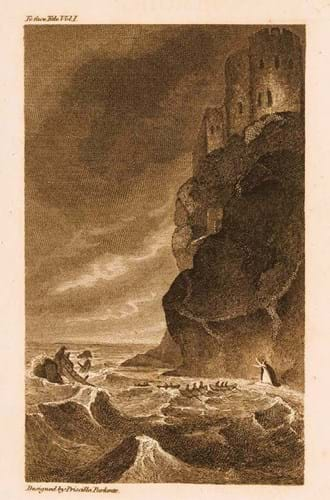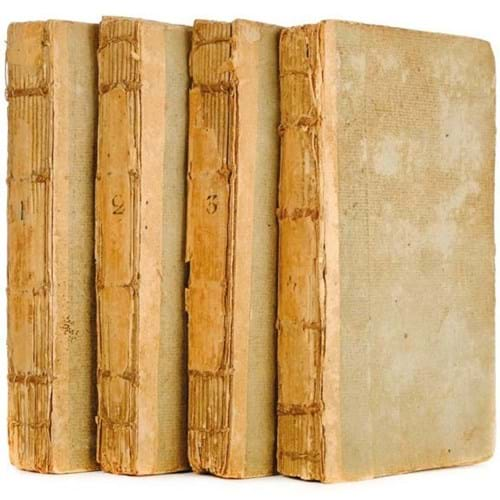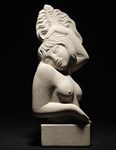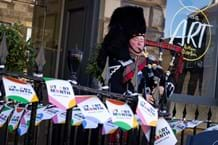
Running to some 100 lots, a private collection of novels of the period that formed part of a Forum Auctions (25/20/12% buyer’s premium) sale of May 30 contained works by well-known writers but also now rare and often forgotten titles.
The identity of the author of Emily, or, the History of a Natural Daughter, sold at £3500 in London, remains to this day unknown. However, both the first edition of 1756 and the 1763, first Dublin edition of the book offered at Forum, which boasted a contemporary calf binding, are of exceptional rarity.
Published in 1781, a two-volume first Dublin edition in contemporary tree calf gilt of The Masqued Weddings, an epistolatory novel by the splendidly named Miss Gertrude Espenchied Elliot, was yet another rarity and sold at £2800.
Bid to £2200 was The Irwin Family, an 1804 first and only Dublin edition of a work, still in the original wrappers, for which the saleroom could find no trace in institutional collections or contemporary reviews.
In that light a passage in the preface, as Forum observed, seems prescient. The author notes that if the work is “…doomed, like hundreds which have proceeded it, to sink into oblivion, I must console myself with the idea of having amused myself, and been of some little use to the paper manufactory of my country”.
Illustrated above is one of the frontispieces produced for a scarce two-volume work of 1808 by ‘Priscilla Parlante’ (Mary Ann Cavendish- Bradshaw), a gothic novel called Memoirs of Maria, Countess d’Alva which in its original boards sold for £2200. The frontispiece illustrations are engraved after originals by the author.
Orsky collection

Untrimmed in the now worn original boards, a four-volume first of Robert Bage’s Man As He Is of 1792 sold at Dominic Winter for £2700.
A few more of these often unfamiliar but very collectable novels featured in the June 26 Gloucestershire dispersal of the diverse and hugely appealing library formed by a well-known English dealer and collector, the late Martin Orsky.
Offered by Dominic Winter (20% buyer’s premium) at £3400 was The Virtuous Criminal; or, the History of Lord Stanley, which though describing itself as a translation from the original French would appear to be a work unrecorded in that language.
Published in two volumes in 1759, it purports to be the memoirs of an English aristocrat who flees to Gibraltar after his lover is murdered by his own father, who had caught the couple in flagrante. There he vies for the hand of Seraphina, the daughter of an Andalusian nobleman, and the tale reaches its blood-soaked denouement in Mexico.
A two-word notice in a contemporary issue of the Monthly Review pronounced the work “Absurdity throughout”, but today the only other copies recorded are in institutional collections, at Harvard and in the John Rylands Library.
Sold at £2200 in South Cerney was a two-volume 1764 first in contemporary calf of Family Pictures…, an anonymously published novel whose extended title further tempts readers with …Interesting Memoirs of Several Persons of Fashion in W-re.
It is in fact the work of Susannah Gunning of Fairwater in Somerset, whose daughter was also a novelist*, but whose own life could have had the makings of yet another novel. Following an acrimonious separation, Gunning’s husband decamped to Naples with his mistress.
One of Gunning’s other books was published by the Minerva Press, which catered to the market for sentimental and Gothic tales and had many female writers on their books, but the four-volume Minerva first of Man As He Is, sold at £2700, was the work of a man, Robert Bage.
In very worn but original boards, it was once the property of an English Reading Society in the Dutch city of Groningen, one established in the very year that the book was published, 1792.
Bage was a businessman who did not publish his first novel until the age of 53 and began writing partly to recoup financial losses. Influenced by Thomas Paine, Voltaire and Rousseau and by the ideals of the American and French revolutions, his novels have been described as sympathetic to the rights of women and opposed to slavery, cruelty, war and duelling. William Godwin and Shelley were both admirers.
The Dictionary of National Biography describes Bage’s novel as a satirical work which “…narrates the rescue of a well-meaning young baronet from fashionable aristocratic vices by his love for a virtuous and independent woman, good friends, and his encounters in France with leaders of the earlier, moderate phase of the revolution”.
* An 1818 three-decker by Elisabeth Gunning, The Exile of Erin, was highlighted as one of the rarities in a singlelot collection of more than 130 Gothic novels sold for £26,000 at Sotheby’s last December – one formed by Mary Hill, Marchioness of Downshire (1774-1836), whose crested monogram featured on most of the bindings.













